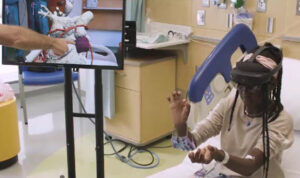
Physicians
-
Correcting Provider Biases About Transgender and Gender Non-Conforming Patients Can Protect Their Health and Safety
Providers, administrators, health insurers and other healthcare-access gatekeepers can learn, train, change policies and remove barriers facing vulnerable groups so they can receive the long-overdue opportunity to pursue their best health and well-being.
-
Delivering Precision Care to Manage Neurodegenerative Diseases
Precision medicine for neurodegenerative conditions has the potential to radically change the way patients are treated and managed over time. As an industry, we must continue to expand our thinking and push the boundaries of science, technology, and data analytics to capture precision medicine opportunities in broader areas of unmet medical needs.
-
Convergence of medtech and health tech: Helping providers plan procedures and easing patient anxiety
A pediatric health system enlisting mixed reality and 3D printing technology illustrates how clinical collaboration and patient education can improve patient outcomes for complex procedures.
-
Nurse Practitioners’ Starting Salaries Are Rising Faster Than Those of Primary Care Physicians
As retail disruptors like CVS, Walgreens and Amazon buy more and more primary care assets, the healthcare industry is seeing an increased demand for physicians and advanced practitioners. In the case of nurse practitioners, this rise in demand is also boosting their salaries. Physicians’ starting salaries have remained relatively flat, but their average signing bonus grew.
-
MedCity Influencers, Payers, Physicians
Cancer Moonshot: Would It Even Be Possible in Today’s Fee-For-Service World?
CMS’ Enhancing Oncology Model and Cancer Moonshot are the forcing functions to achieve value-based care in oncology. In the spirit of working together to improve lives, this is a MUST for physicians to consider–before they get left behind.
-
Patient Engagement Is Key to the Success of Value-Based Care Programs
While greater operational efficiency and cost control are essential to the success of VBC initiatives, so too is patient engagement. Care coordination and care management are far more difficult – and far less likely to achieve optimal outcomes – without patients who are fully engaged with their providers.
-
Prescribing Change for the Impact Pharmacists Can Make in Healthcare
Even as value-based care finds its footing and expands further, team-based approaches to care delivery incorporating pharmacists as crucial connections are already bearing results—helping provider organizations achieve 5-star CMS ratings for medication adherence, driving down costs, and driving up the quality of life for patients.
-
How to Improve Poor Data Quality Across the Healthcare Ecosystem and Make Workflows More Manageable
The webinar, sponsored by Intelligent Medical Objects, will explore the impact of poor data quality and methods to improve patient data quality. It will also highlight healthcare industry employee burnout and how to improve retention.
-
U.S. Healthcare Pandemic Recovery Requires Focused Support of Independent Primary Care
Independent primary care practices are at risk of extinction. The U.S. must re-dedicate itself to the preservation of independent primary care over the long run and must undergo a radical reorientation of the health system toward primary care.
-
Improving health in one of the most complex and costly chronic conditions
Kidney care in the U.S. needs an overhaul. Changing today’s expensive, disconnected care model requires moving from volume to value.
Misha Palecek, Chief Transformation Officer, DaVita Kidney Care
-
MedCity Influencers, Health Tech
How Telemedicine Can Combat Clinician Burnout, the Biggest Challenge Facing the Healthcare Industry
To fully reap the benefits of telemedicine, it is crucial to provide comprehensive education to both staff and patients. Clinicians, doctors, and other medical care providers should all be trained on telehealth software — its functionality, integration into their workflow, effective communication during consultations, and where to seek technical assistance.
-
MedCity Influencers, BioPharma
The Crucial Role of Medical Affairs in Bridging the Educational Gap Among Healthcare Professionals in Biosimilars
Biosimilars represent an important therapeutic option in modern healthcare, offering cost-effective alternatives to complex biological drugs. The educational gap among healthcare professionals poses a challenge to their widespread adoption. Medical Affairs teams in the pharmaceutical industry are at the forefront of bridging this gap
-
Don’t Be Caught Unprepared: How to Develop a Crisis Communications Plan
On any given day there may be more pressing issues to handle, and many companies believe “it won’t happen to us” – that is, until it does happen to you, and then it’s more important than ever to be prepared and confident with your crisis communications plan.
-
Clinicians Offer Snapshot from Day in the Life of Delivering Care at Teladoc Health
In a series of interviews, two Teladoc Health physicians and a therapist offered a window into a day in the life of delivering virtual care.
-
How Hospitals Are Reducing Gun Violence, Protecting Patients and Staff
Hospitals are places of healing, but they have also become sites of gun violence. A panel at the MedCity News INVEST conference discussed the ways hospitals can reduce threats and de-escalate situations before they become violent.































